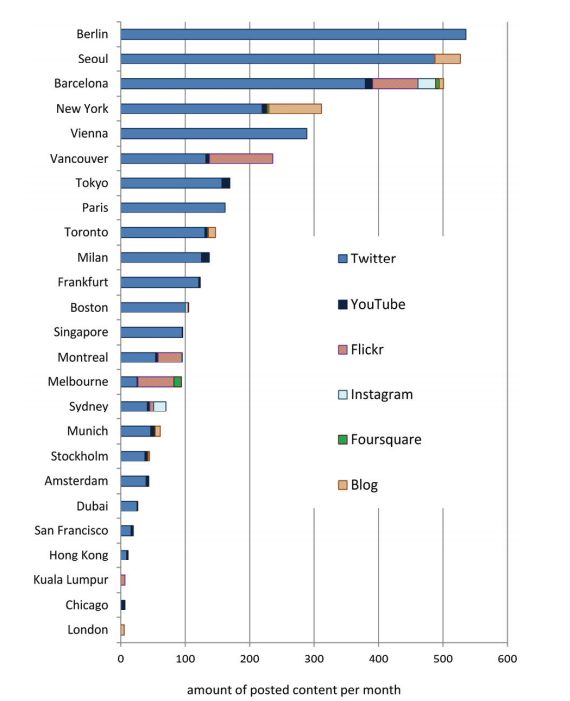Why London Comes Last in Social Media City Rankings
When it comes to the world of social media, there are clear metrics for measuring popularity. On Twitter for example, the account with the largest following is @katyperry with 49,952,646 at the time of writing. That’s followed closely by @justinbieber on 49,167,914 and @BarackObama on 41,190,787. On Facebook, the most popular page (after Facebook itself) is Rihanna with 84,757,949 likes, followed by Eminem with 81,091,160 likes and Shakira with 80,501,539 likes.

It’s just as easy to measure the social media activity such as number of posts and so on and even to subdivide the searches by category such as cars, movie character or video game.
Now Agnes Mainka and pals at Heinrich Heine University in Düsseldorf, Germany, have studied the social media services provided by the governing bodies of 31 major cities around the world that have hi-tech infrastructures, so-called Informational World Cities. That includes cities ranging from Amsterdam to Vienna by way of London and San Francisco.
So the obvious question is who comes out on top?
These guys measure the number of different types of social media account that each city publishes, the amount of activity on these accounts and the number of followers. They also look at the links to and from city social media accounts and their websites.
A number of cities stand out. Most cities concentrate on one social media service. But Barcelona, in Spain, is unusual because it uses a variety of different services to connect with its population. It publishes more than 300 tweets per month on Twitter, 70 picture per month on Flickr and almost 30 per month on Instagram.
By contrast, Paris is the most popular city with almost 700,000 Facebook likes. Hong Kong has the most Twitter followers: about 650,000 of them. While Shenzen in China and Munich in Germany both outstrip US powerhouses such as San Francisco and New York in the popularity stakes.
And Berlin is the most active city, publishing well over 500 tweets per month.
So it’s not so easy to put your finger on the city that tops the league tables for social media. But it’s straightforward to see who comes bottom.
The bad news for Cool Britannia is that its capital showpiece props up the tables on a number of metrics. London is the least active of the Informational World Cities in terms of number of posts/tweets/pictures etc. And has too few followers/likes etc to even feature on the list of most popular cities.
What isn’t clear, of course is whether this team has found all the social media accounts associated with the city. There could be plenty of activity that these guys haven’t found.
But if so, London’s social media sites must be particularly hard to find, given that the team has used the same techniques for all the cities in this study.
Perhaps London and its eccentric mayor, Boris Johnson, need to learn a little more about social media.
Ref: arxiv.org/abs/1401.4533 : Government and Social Media: A Case Study of 31 Informational World Cities
Keep Reading
Most Popular
Large language models can do jaw-dropping things. But nobody knows exactly why.
And that's a problem. Figuring it out is one of the biggest scientific puzzles of our time and a crucial step towards controlling more powerful future models.
The problem with plug-in hybrids? Their drivers.
Plug-in hybrids are often sold as a transition to EVs, but new data from Europe shows we’re still underestimating the emissions they produce.
Google DeepMind’s new generative model makes Super Mario–like games from scratch
Genie learns how to control games by watching hours and hours of video. It could help train next-gen robots too.
How scientists traced a mysterious covid case back to six toilets
When wastewater surveillance turns into a hunt for a single infected individual, the ethics get tricky.
Stay connected
Get the latest updates from
MIT Technology Review
Discover special offers, top stories, upcoming events, and more.